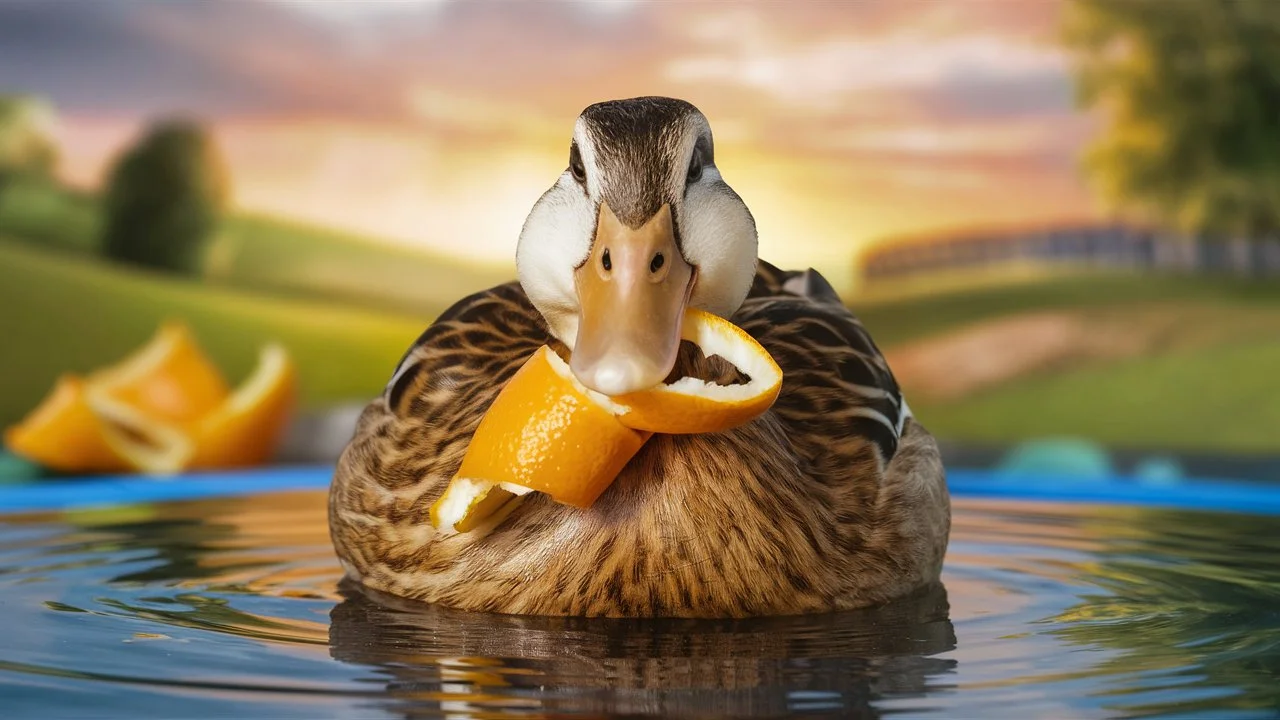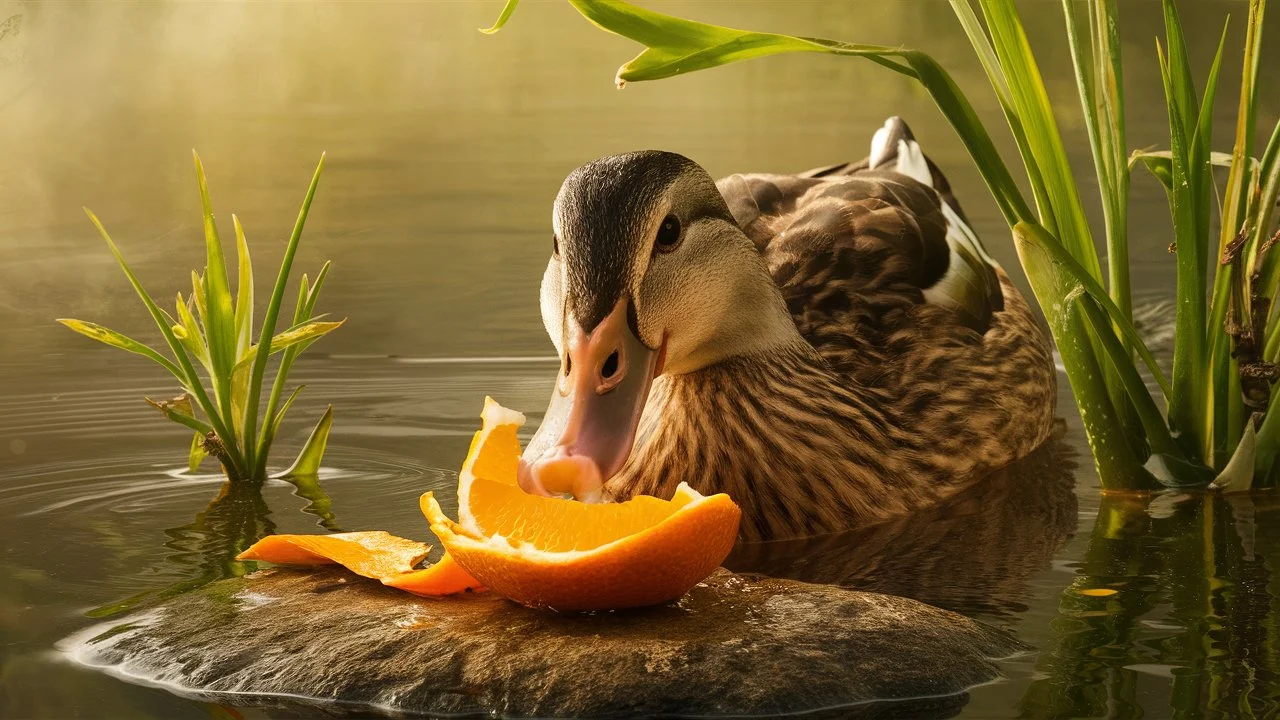Feeding ducks can be a delightful and rewarding experience, both for the feeder and the feathered friends. However, ensuring that what we offer to ducks is safe and nutritious is crucial for their health and well-being. One common question that arises among duck enthusiasts is whether ducks can eat orange peels.
Oranges, known for their vibrant color and rich vitamin C content, seem like a healthy treat, but their tough peels might pose some concerns. In this guide, we will explore the suitability of orange peels in a duck’s diet, addressing their nutritional value, potential risks, and alternative treats that are safer and more beneficial for our quacking companions. By understanding what’s best for ducks, we can help them stay healthy and happy, enjoying their natural behaviors in a safe environment.
Ducks should not eat orange peels. The peels are tough, hard to digest, and can pose a choking hazard. Instead, feed ducks the fleshy part of the orange in small, manageable pieces, ensuring it’s part of a balanced diet. Always introduce new foods gradually and observe for any adverse reactions.
Ducks can eat a variety of fruits, but when it comes to orange peels, it’s best to be cautious. Here’s a detailed look at why and how to feed oranges to ducks:
Can Ducks Eat Orange Peels?
Ducks can eat a variety of fruits, but when it comes to orange peels, it’s best to be cautious.

Here’s a detailed look at why and how to feed oranges to ducks:
1. Nutritional Content:
- Oranges: Oranges themselves are nutritious, providing vitamin C, fiber, and other beneficial nutrients.
- Orange Peels: While the peel also contains nutrients, it is tougher and harder to digest than the fruit itself.
2. Digestibility:
- Ducks may find orange peels difficult to chew and digest. The tough texture can pose a choking hazard, especially for smaller ducks or ducklings.
3. Pesticides and Chemicals:
- Orange peels can sometimes contain pesticide residues or other chemicals used during farming. Washing the peel thoroughly can reduce this risk, but it’s not always entirely eliminated.
Feeding Oranges to Ducks
1. Peel and Segment:
- It’s safer and more nutritious to feed ducks the fleshy part of the orange. Remove the peel and any seeds, then cut the fruit into small, manageable pieces.
2. Moderation:
- Like all fruits, oranges should be given in moderation. Ducks’ primary diet should consist of a balanced feed specifically designed for them, which provides all necessary nutrients.
3. Observing Reactions:
- When introducing any new food, observe the ducks for any adverse reactions. If they seem to have trouble eating or digesting the fruit, it’s best to avoid giving it to them in the future.
Safe Alternatives
If you want to offer your ducks a treat, there are other fruits and vegetables that are safer and more commonly recommended:
1. Safe Fruits:
- Apples (without seeds)
- Berries (strawberries, blueberries, raspberries)
- Grapes (cut in half)
- Melons (like watermelon and cantaloupe, without seeds)
2. Safe Vegetables:
- Peas
- Corn
- Leafy greens (lettuce, kale, spinach)
- Cucumbers
- Carrots (shredded or chopped)
Related reading:Can Ducks Eat Chocolate?
Can Ducks Eat Orange Peels Every Day?
Feeding ducks can be enjoyable, but it’s crucial to understand what foods are safe and nutritious for them. When it comes to orange peels, there are several factors to consider. Here’s a detailed look at why feeding orange peels to ducks every day is not advisable.
Nutritional Content and Digestibility
1. Tough Texture and Digestibility:
- Orange Peels: Orange peels are tough and difficult for ducks to chew and digest. Ducks lack the digestive capability to break down the fibrous texture of the peel, which can lead to digestive issues or even choking hazards.
- Flesh of Oranges: The fleshy part of the orange is much softer and easier for ducks to eat and digest. It provides essential nutrients like vitamin C, fiber, and antioxidants.
2. Nutritional Balance:
- Ducks require a balanced diet to stay healthy. While oranges can provide some vitamins, they should not replace a nutritionally balanced feed that is specifically designed for ducks.
- Duck Feed: A balanced duck feed contains the necessary nutrients, vitamins, and minerals that ducks need for their overall health and well-being.
Potential Risks
1. Pesticide Residues:
- Orange peels can contain pesticide residues from farming practices. Even thorough washing might not completely remove these chemicals, which can be harmful to ducks.
- Organic Options: If you do consider giving orange peels, opting for organic oranges can reduce the risk of pesticide exposure, but the other concerns with peels still remain.
2. Overconsumption of Certain Nutrients:
- Feeding ducks oranges (including the peels) every day can lead to overconsumption of certain nutrients, like vitamin C. While vitamin C is beneficial, excessive amounts can disrupt the nutritional balance.
Alternative Treats
1. Safe Fruits:
- Apples: Remove the seeds and cut into small pieces.
- Berries: Strawberries, blueberries, and raspberries are safe and nutritious.
- Grapes: Cut in half to prevent choking.
- Melons: Watermelon and cantaloupe (without seeds) are hydrating and safe treats.
2. Safe Vegetables:
- Peas: Ducks love peas, which are nutritious and easy to eat.
- Corn: Fresh or frozen corn kernels are a good option.
- Leafy Greens: Lettuce, kale, and spinach can be given in moderation.
- Cucumbers and Carrots: Cut into small, manageable pieces to prevent choking.
Frequency and Moderation
1. Occasional Treats:
- Fruits and vegetables should only be given as occasional treats. The primary diet of ducks should consist of a balanced duck feed.
- Introduction: Introduce new foods gradually and observe for any adverse reactions.
2. Balanced Diet:
- Ensure that ducks have access to a variety of foods that meet their nutritional needs. This includes high-quality duck feed, occasional fruits and vegetables, and plenty of fresh water.
Can Ducks Eat Orange Peels Raw or Cooked?
Feeding ducks can be a delightful activity, but it’s important to ensure that what you offer them is safe and beneficial for their health. When it comes to orange peels, there are several factors to consider, whether they are raw or cooked. Here’s a detailed look at the suitability of orange peels in a duck’s diet.
Raw Orange Peels
1. Tough Texture and Digestibility:
- Raw Peels: Raw orange peels are tough and fibrous, making them difficult for ducks to chew and digest. Ducks have a simpler digestive system compared to humans, and the tough texture can lead to digestive issues or even choking hazards.
2. Nutritional Imbalance:
- Nutritional Concerns: While orange peels do contain some vitamins and fiber, they are not nutritionally balanced for ducks. Ducks require a diet that meets all their nutritional needs, which orange peels alone cannot provide.
3. Pesticide Residues:
- Potential Harm: Raw orange peels can contain pesticide residues from agricultural practices. These chemicals can be harmful to ducks, even if the peels are washed thoroughly.
Cooked Orange Peels
1. Altered Texture:
- Cooked Peels: Cooking orange peels can soften their tough texture, making them somewhat easier for ducks to chew. However, even cooked, they may still be difficult for ducks to digest fully.
2. Nutrient Loss:
- Cooking Process: Cooking can cause some nutrient loss, particularly vitamin C, which is sensitive to heat. This reduces the already limited nutritional value of orange peels for ducks.
3. Digestibility and Safety:
- Digestive Issues: While cooking can make orange peels softer, it does not completely eliminate the risk of digestive issues. Ducks may still struggle to process the fibrous material.
Alternatives to Orange Peels
Given the potential issues with feeding orange peels to ducks, consider offering them safer, more nutritious alternatives:
1. Safe Fruits:
- Apples: Remove the seeds and cut into small pieces.
- Berries: Strawberries, blueberries, and raspberries are safe and nutritious.
- Grapes: Cut in half to prevent choking.
- Melons: Watermelon and cantaloupe (without seeds) are hydrating and safe treats.
2. Safe Vegetables:
- Peas: Ducks love peas, which are nutritious and easy to eat.
- Corn: Fresh or frozen corn kernels are a good option.
- Leafy Greens: Lettuce, kale, and spinach can be given in moderation.
- Cucumbers and Carrots: Cut into small, manageable pieces to prevent choking.
Feeding Guidelines
1. Occasional Treats:
- Moderation: Fruits and vegetables should be given as occasional treats. The primary diet of ducks should consist of a balanced duck feed designed to meet all their nutritional needs.
2. Introduction:
- Gradual Introduction: Introduce new foods gradually and observe for any adverse reactions. This helps ensure that the ducks do not have any negative responses to the new food.
3. Balanced Diet:
- Nutritional Balance: Ensure that ducks have access to a variety of foods that meet their nutritional needs, including high-quality duck feed, occasional fruits and vegetables, and plenty of fresh water.
Conclusion
While ducks can technically eat orange peels, it’s not recommended due to the potential difficulties in digestibility and the risk of pesticide residue. Instead, offer them the flesh of the orange in small, manageable pieces and ensure their diet remains balanced with appropriate duck feed. Always introduce new foods gradually and observe for any adverse reactions.

